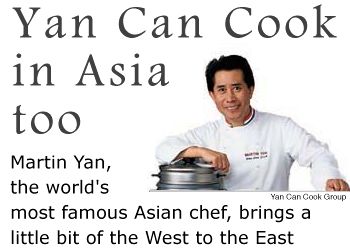

For a cook, Martin Yan spends a lot of time out of the kitchen.
In the past few weeks, he has been to Thailand, Mexico and three U.S. cities. On this day, he is paying for his wanderlust. A hacking cough interrupts his conversation during a telephone interview squeezed in from his home near San Francisco before he boards a plane for an appearance at a home and garden show in Fargo, North Dakota.
While the globe-trotting can be grueling, it is not without its benefits. Today Yan is the most popular Asian chef in the world and a self-described ambassador of culture between Asia and the rest of the world. In recent years, as the culinary bridge from Asia to the rest of the world has become a two-way street, he has begun to bring Western influences to the cuisine he presents in Asia. "The cuisine has become global, just like the economy and the media," Yan says. ". . . I'm just riding the wave."
For 20 years, on his weekly television show, "Yan Can Cook," Yan has brought Chinese and Asian cuisine to audiences around the world. The show is broadcast in 240 U.S. markets and in 80 other countries. Today, he also tapes about 50 shows a year in Cantonese and Mandarin that air in Hong Kong, Malaysia, Singapore and other places in Asia where the Chinese dialects are spoken.He has also authored a dozen cookbooks and spends about 250 days a year making personal appearances, about half of them in Asia.
While best known for popularizing Asian cuisine in the West, Yan today spends a lot of time spreading Western cooking methods to Asia. As Asia's living standards have improved, the cooking and eating habits of the population have changed. More supermarkets carry Western-style foods and seasonings, and more frozen products on sale, popularizing a diverse array of cuisine, Yan says.
Not that people in Asia are eating American-style meat and potatoes everyday. The changes are more in the preparation than in the ingredients. For example, a cut of meat that was fried before might be baked now.
"Before it was very rare (in Asia) to do baking because of the hot weather, but now that's changing," Yan says.
Using Western-style preparation, a dungeoness crab marinade would still be made with Chinese seasonings, but Yan might bake it with cheese. He also says he is using Latin American salsa in some dishes and using more
READ ON: Fusion makes its way to Asia
Pius
Lee
Political star
Peter
Louis
Feng shui master
Phoebe
Man
21st century artist
Coming soon
In
late May, journalism students from
UC Berkeley will travel to
Hong Kong. Watch for their reports.